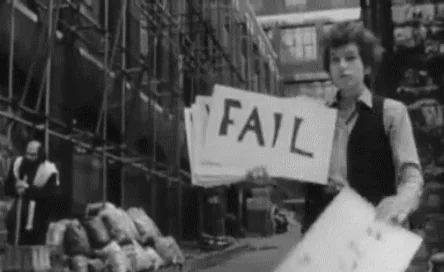Hello Maker,
Your sweet words about (and pictures of) Making Time are so darn beautiful. Thank you for sharing them with me; I wrote the book for you, so I’m so happy it can be in your hands now.
I have two events coming up that I’d love to see you at. They’re free, just RSVP!
Minneapolis, MN: Feb. 11 at 7pm. Open Book
New York, NY: Feb. 19 at 7pm. 91 Leonard St.
Now, for some notes on failure
I think I discovered something about failure that I didn’t know before.
I’ll tell you about it, but first I’ll fail to tell you about it.
I hear agreement all over the political spectrum that our systems are failing.
We all act like we know what failure is, even as we’re looking at different problems.
In the thirteen years I have lived in the U.S., I have never heard anyone say they think the American educational system is successful.
But people have gotten mad at me online when I’ve suggested it could actually be better in concrete ways, and that’s quite something. Like I’m being viciously naive.
Hope invites this aggression. Let’s call it Hope Aggression.
Failure might just be something that happens, but the pain of failure might be the shame of having hoped for another thing to happen.
This shame is cruel to our tenderest, most open heart. It sees a desire — a connection to possibility — and tries to squish it with its big toe.
So failure is not its own feeling: failure’s suffering arrives when hope meets shaming.
Hope is Oliver Twist wanting more, and shame is the horrified master:
When we fail, we are often the one who hoped, and we internalize the cruel master — to self, to other, to the world.
"How stupid of me to have hoped."
"How dare they let me hope."
Someone asked me on a podcast how I got to be where I am. First, I wondered where I am. Then I answered, “Failing a lot!”
Many dreams made me run, run, run toward them until they led me face-first into yellow brick walls.
Like this dream: Working at a magazine in New York City (read that with the reverence of a girl from Winnipeg)!
The reality: Living with two ornery roommates in a tiny apartment in Windsor Terrace, Brooklyn, taking four separate trains to work twice each day, all for the pleasure of accruing debt to keep going.
Not all failure is a single rejection. Sometimes it’s an accumulation of small resistances — an erosion of ease, a steady, impersonal no that seems to be coming from Life itself.
When faced with a pile of resistance, I want to ask, “Why is life rejecting me? What is wrong with me? What is wrong with this whole thing?”
This all suggests that longing is lack, that wanting is a wound that needs to heal as soon as possible.
Every dead end dismantled some illusion I didn’t know I was still serving. This brought me closer to reality (read: life itself), which is what I wanted in the first place.
Life does not reject us, but the shaming of our hope might make us want to reject the life within us.
That, more than failure, is the real loss.
Thanks for being willing to work with possibility, folks. I appreciate you deeply.
Love,
Maria







I think what you're saying on a personal level is true, but totally different than an institutional failure to educate children. For them, being in a failing school does offer them lessons, but maybe not ones we want to offer them.
Maria, I resonate with all of this so deeply! As a musician and someone that grew up queer in a conservative and highly religious home, it's a battle every day to let my hope not be ashamed. This is such an important conversation, thank you for calling it out!